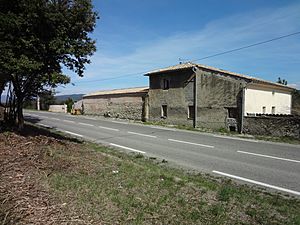Jack Drummond facts for kids
Quick facts for kids
Jack Drummond
|
|
|---|---|
| Born | 12 January 1891 Newington, London, England, UK
|
| Died | 4 August or 5 August 1952 (aged 61) near Lurs, France
|
| Nationality | British |
| Alma mater | Queen Mary, University of London King's College London |
| Known for | naming of vitamins nutrition under wartime rationing |
| Awards | Fellow of the Royal Society |
| Scientific career | |
| Fields | Biochemistry Nutrition |
| Institutions | University College London |
| Academic advisors | Otto Rosenheim |
| Notes | |
|
There is much speculation over the identity of his murderer or murderers, and the motive behind the crime.
|
|
Sir Jack Cecil Drummond (born January 12, 1891 – died August 4 or 5, 1952) was a British biochemist. He was famous for his important work on nutrition, especially how it helped people in Britain during World War II when food was rationed. Sadly, he, his wife, and their young daughter were tragically killed while on holiday in France in 1952. This event became known as the Dominici affair.
Contents
Early Life and Family
Jack Drummond was born in 1891, likely in Newington or Kennington, London. His father, John Drummond, died when Jack was very young. Jack was then adopted and raised by his aunt, Maria Spinks, in Charlton.
He went to The John Roan School and King's College School. Later, he started using the name Drummond again, which was his birth name.
In 1915, Jack married Mable Helen Straw. They were married for 24 years. Later, he married Anne Wilbraham in 1940. Their only child, Elizabeth, was born in 1942.
Amazing Scientific Career
Jack Drummond was a very smart student. In 1912, he earned top honors in chemistry from East London College (now Queen Mary University of London). He then became a research assistant at King's College London.
Discovering Vitamins
In 1914, he started working at the Cancer Hospital Research Institute. There, he met Casimir Funk, who had created the word vitamine. This is when Jack became very interested in nutrition.
He helped study fat-soluble vitamins and how they affect human health. In 1918, he wrote an important paper about feeding babies.
In 1919, he moved to University College London (UCL). In 1920, he suggested that the important substances discovered by other scientists should be called Vitamins A and B. He also removed the 'e' from Funk's word, making it "vitamin," because not all of them were "amines."
At just 31 years old, in 1922, he became the first Professor of Biochemistry at UCL. He held this important job until 1945.
Improving Britain's Diet
In the 1930s, Jack Drummond realized how important it was to use scientific knowledge about nutrition to help people in real life. He studied the English diet over 500 years. He wrote a book about it called The Englishman's Food, with his future wife Anne Wilbraham.
When World War II began, the government asked him for help. In 1940, he became the Scientific Adviser to the Ministry of Food. He created a plan to distribute food based on healthy eating principles.
Thanks to his advice, food rationing during the war actually made the nation healthier! Poorer people got more protein and vitamins, and wealthier people had to eat less meat, fats, and sugar. Studies after the war showed that people's health improved, even during wartime.
Jack Drummond was knighted in 1944 for his great contributions. He also became a Fellow of the Royal Society, which is a very high honor for scientists.
After the war, he continued to advise on nutrition for different organizations. In 1945, he joined Boots Pure Drug Company as Director of Research.
Tragic Murder
On the evening of August 4, 1952, Sir Jack Drummond, his wife Anne, and their 10-year-old daughter Elizabeth were on holiday in France. They stopped their car near a farmhouse called La Grand'Terre, close to the main road.
The next morning, on August 5, their bodies were found. Anne's body was near the car, and Jack's was on the other side of the road. Both had been shot. Elizabeth's body was found a bit further away, near a path leading to a river. She had been killed by a severe blow.
The Drummond family is buried in the cemetery of Forcalquier, a town in France. A cross marks the spot where Elizabeth's body was found.
Investigation and Aftermath
A local farmer named Gaston Dominici was later found guilty of the murders in November 1954 and sentenced to death. However, there were many questions about the police investigation and the trial.
Later, the President of France changed Gaston Dominici's sentence to life in prison. Another president, Charles de Gaulle, ordered Dominici's release, but he was never officially pardoned.
The murders of the Drummond family are still a topic of much discussion in France today.
Awards and Honours
- 1918: Received his D.Sc. degree from the University of London
- 1944: Knighted by the King
- 1944: Elected a FRS
- 1946: Awarded the Commander (Civil Division) of the Order of Orange-Nassau
- 1946: Became an Honorary Member of the New York Academy of Sciences
- 1947: Received the Lasker Group Award
- 1948: Received an honorary doctorate from the University of Paris
- Awarded the United States Medal of Freedom with Silver Palms
See also
- List of biochemists
 | Kyle Baker |
 | Joseph Yoakum |
 | Laura Wheeler Waring |
 | Henry Ossawa Tanner |


